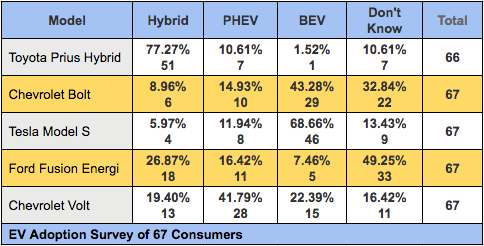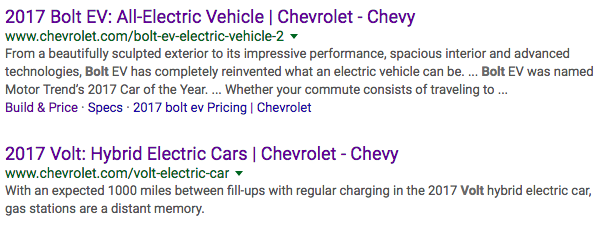While less critical than the other mistakes, I believe GM made two potential brand errors.
I love the name “Bolt.” I also love the name “Volt.” But as an EV advocate I know in my sleep the difference between the two models as well as BEVs and PHEVs. The average car buyer does not.
While I don’t believe any research on this naming confusion exists, my own informal conversations with a friend who owns a Bolt and non-EV expert friends revealed that many people don’t know the difference between the Volt and Bolt, let alone what the difference is between a “PHEV” and BEV.
To understand this better, I conducted a small survey of 67 US consumers on social media, which while not statistically valid, nonetheless confirmed for me the confusion I was  seeing in conversations.
seeing in conversations.
The Google search engine seems to be a bit confused. For several searches I’ve conducted involving the Chevrolet Bolt, the organic search results often mix in links for the Volt. The second organic result for a search on “Chevrolet Bolt” in fact is for Volt (good for Chevrolet, but confusing for searchers.)
In response to my question about the potential confusion, GM responded: “There is an instant familial recognition with the two names and with the reputation for quality and durability Volt has earned, Bolt EV honors that in both name and service.”
Secondly it’s a Chevrolet. During the 1920s GM CEO Alfred Sloan was attributed with the aphorism “a car for every purse and purpose” that described GM’s integrated, multi-brand marketing strategy. Each of the GM brand’s products was to be focused on one segment, with Chevrolet at the low end of the market and Cadillac at the high end.
While GM’s portfolio of auto brands has been slimmed down over the last two decades, Chevrolet is still the entry-level brand and Cadillac the luxury division. So why did GM choose to launch its supposed world-beating 238-mile range, $40,000 EV under the low-end Chevrolet brand?
With EV sales hovering just under 1 percent in the US and now at 4.8 percent in California, American EV buyers are still comprised of “Innovators” and “Early Adopters.” These buyers are characterized by wanting the latest and coolest technologies and/or products that make a statement or achieve some higher purpose. Or, as we saw with the Nissan LEAF in Georgia a few years ago, they will exchange shortcomings (e.g., short range) if the price is right.
An electric Chevrolet Bolt, even a really good one, at this stage of the market is simply not going to excite most early adopters. Both the Volt and the Bolt are indeed succeeding at attracting buyers who would never have considered purchasing at Chevrolet. And that is a good thing for the brand.
GM’s response to my question about “Why launch the Bolt as a Chevrolet?”: “The Bolt EV breaks the affordability barrier for a long-range EV and delivers on our promise to make electrification an available option to a wider group of buyers.”
That is a novel goal, but isn’t a smart strategy when we are still so early in the adoption of EVs. In 3-5 years, this strategy would make much more sense. But timing is critical.
So you must ask: Is the Bolt sold under the Chevrolet marque the best strategy to maximize sales of the Bolt, or simply the most convenient GM brand to attach the Bolt to and help energize the brand? Is the Bolt’s job to energize green EV buyers like the Corvette attracts sports car enthusiasts?
Fixes: The brand issues are potentially complex and costly, so I understand why the Bolt is a Chevrolet. But the folks in suits in Detroit could have considered a few different options:
- Launching the Bolt under the Buick brand. The Bolt could be sold as a Buick in America as I’m guessing it will be marketed that way in China as the sister Volt model is as a Buick Velite 5. The Buick brand, while certainly not a high-end brand, might be a better fit for the higher cost of the Bolt and more image-conscious buyers located on the two coast of America. Using the Buick nameplate for the Bolt would also have lessened the confusion between it and the Chevrolet Volt.
- Relaunch the Saturn brand. I’m probably pushing the envelope on this one, but the Saturn brand and its “A different kind of company” tagline could have been the ideal brand platform to launch an entirely new kind of electric car. The name Saturn itself conjures up a sense of the future and electricity. The brand opportunities and approach to marketing, sales through subscriptions and dealer reps highly knowledge about electric cars. The “Saturn Bolt” could still be sold and serviced through Chevrolet dealers, but underneath a distinct brand.
- Create a Bolt “sub-brand.”Similar to the Prius model brand, position the Bolt as a new line of electric cars that is an extension of the Chevrolet brand. They would be sold and serviced as Chevrolets but positioned as a special model line of electric-only cars. While more subtle than being part of an actual separate brand, it would at least give the Bolt a little bit more cache.
Related:
- 5 Months of Chevrolet Bolt Sales: What Do The Numbers Tell Us So Far?
- 6 Strategic Mistakes GM Made With the Chevrolet Bolt (Part 1: Targeting a Market Instead of a Buyer Persona)
- 6 Strategic Mistakes GM Made With the Chevrolet Bolt (Part 2: Lack of fast charging and destination charging networks)
- 6 Strategic Mistakes GM Made With the Chevrolet Bolt (Part 3: Price is too high)
- 6 Strategic Mistakes GM Made With the Chevrolet Bolt (Part 4: Not offering different battery/range options)
 Announcing the acquisition of EVAdoption by Paren →
Announcing the acquisition of EVAdoption by Paren →

6 Responses
Chevy Bolt is an American car that is designed for non-American market like European and Asian markets, where roads and parking spaces are smaller. Look at the length (164 inches) of the vehicle. Just too short and lack the cargo space for traveling outside of the large metropolitan area. The range is fine. I would rather buy a Leaf if it has the range of the Bolt.
I’ve driven my Bolt for over a year and have easily hauled 8 foot 2 by 6s or 10 bags of mulch. Been on 250 mile trips with range to spare. The nominal range is 239 miles, determined somehow, but, in late spring to early fall, I get 320 to 340 miles/charge. There have been no problems so far. In warm weather, and with normal driving, I get 5.5 miles per kilowatt-hour or a propulsion cost of less than 3 cents/mile. Compare that with 20 mpg with $2.40/gallon gasoline or 12 cents/mile. Best of all, it’s really fun to drive. Sadly, GM doesn’t seem to want to market the Bolt – I only got mine because of a quirk, but I’m glad I got it. I wish I knew why.
I assume the “Chevy Jolt” will be released by 2025 or so. I would not be surprised if GM has already trademarked it.
I would not be surprised if GM has already trademarked it.
So my friend Matt Teske of Chargeway.net created this Chevy Jolt site several years ago … https://www.chevyjoltev.com/
Has GM contacted him about buying the site?
He told me a few years ago, but I can’t remember what they said … I think they weren’t interested. But he didn’t create the site to sell it.